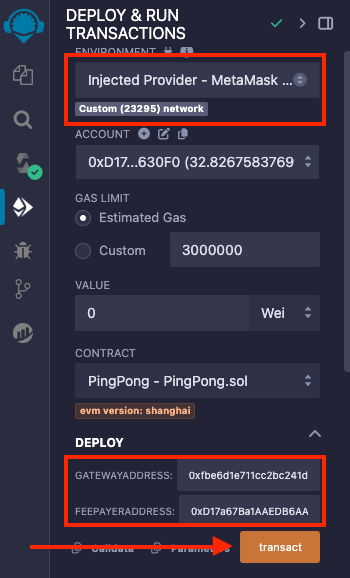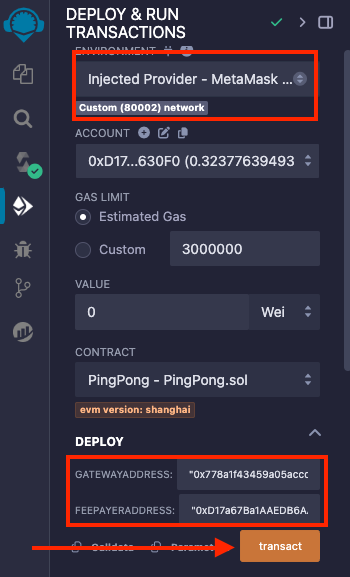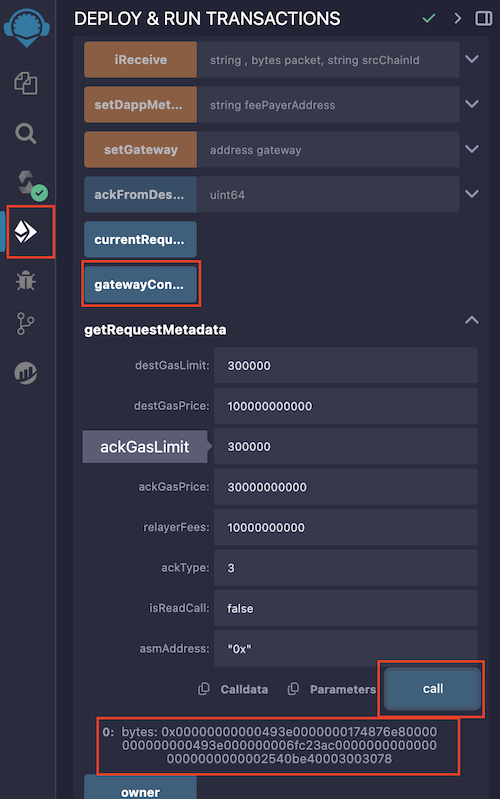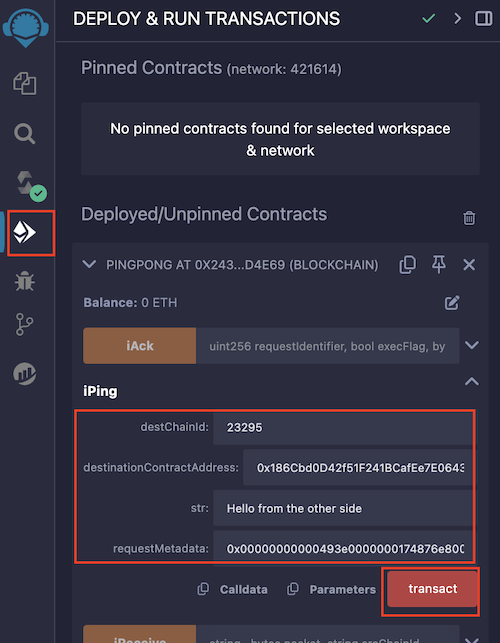PingPong Example
This tutorial demonstrates how to send a cross-chain message using Router Protocol's CrossTalk.
You'll learn how to:
- Deploy Router-compatible contracts
- Approve the feePayer for your contracts
- Prepare metadata for cross-chain calls
- Send cross-chain messages
We recommend using Remix for an easy-to-follow experience. The only prerequisite is a set-up Metamask account.
If you're new to Remix, follow our basic guide for using Remix here.
Overview PingPong
In this example, you'll deploy the same contract on two different chains.
You'll then send a ping from chain A to chain B, facilitated by Router
Protocol's CrossTalk. The contract on chain B will receive the ping and
respond back to Router Protocol. Finally, Router Protocol will send an
acknowledgment message back to the contract on chain A.
Contract Setup
- Open Remix and create a new file called
PingPong.sol - Paste the following contract into it:
PingPong.sol Contract
//SPDX-License-Identifier: UNLICENSED
pragma solidity >=0.8.0 <0.9.0;
import "@routerprotocol/evm-gateway-contracts/contracts/IGateway.sol";
/// @title PingPong
/// @author Yashika Goyal
/// @notice This is a cross-chain ping pong smart contract to demonstrate how one can
/// utilise Router CrossTalk for cross-chain transactions.
contract PingPong {
address public owner;
uint64 public currentRequestId;
// srcChainId + requestId => pingFromSource
mapping(string => mapping(uint64 => string)) public pingFromSource;
// requestId => ackMessage
mapping(uint64 => string) public ackFromDestination;
// instance of the Router's gateway contract
IGateway public gatewayContract;
// custom error so that we can emit a custom error message
error CustomError(string message);
// event we will emit while sending a ping to destination chain
event PingFromSource(
string indexed srcChainId,
uint64 indexed requestId,
string message
);
event NewPing(uint64 indexed requestId);
// events we will emit while handling acknowledgement
event ExecutionStatus(uint256 indexed eventIdentifier, bool isSuccess);
event AckFromDestination(uint64 indexed requestId, string ackMessage);
constructor(address payable gatewayAddress, string memory feePayerAddress) {
owner = msg.sender;
gatewayContract = IGateway(gatewayAddress);
gatewayContract.setDappMetadata(feePayerAddress);
}
/// @notice function to set the fee payer address on Router Chain.
/// @param feePayerAddress address of the fee payer on Router Chain.
function setDappMetadata(string memory feePayerAddress) external {
require(msg.sender == owner, "only owner");
gatewayContract.setDappMetadata(feePayerAddress);
}
/// @notice function to set the Router Gateway Contract.
/// @param gateway address of the gateway contract.
function setGateway(address gateway) external {
require(msg.sender == owner, "only owner");
gatewayContract = IGateway(gateway);
}
/// @notice function to generate a cross-chain request to ping a destination chain contract.
/// @param destChainId chain ID of the destination chain in string.
/// @param destinationContractAddress contract address of the contract that will handle this
/// @param str string to be pinged to destination
/// @param requestMetadata abi-encoded metadata according to source and destination chains
function iPing(
string calldata destChainId,
string calldata destinationContractAddress,
string calldata str,
bytes calldata requestMetadata
) public payable {
currentRequestId++;
bytes memory packet = abi.encode(currentRequestId, str);
bytes memory requestPacket = abi.encode(destinationContractAddress, packet);
gatewayContract.iSend{ value: msg.value }(
1,
0,
string(""),
destChainId,
requestMetadata,
requestPacket
);
emit NewPing(currentRequestId);
}
/// @notice function to get the request metadata to be used while initiating cross-chain request
/// @return requestMetadata abi-encoded metadata according to source and destination chains
function getRequestMetadata(
uint64 destGasLimit,
uint64 destGasPrice,
uint64 ackGasLimit,
uint64 ackGasPrice,
uint128 relayerFees,
uint8 ackType,
bool isReadCall,
string memory asmAddress
) public pure returns (bytes memory) {
bytes memory requestMetadata = abi.encodePacked(
destGasLimit,
destGasPrice,
ackGasLimit,
ackGasPrice,
relayerFees,
ackType,
isReadCall,
asmAddress
);
return requestMetadata;
}
/// @notice function to handle the cross-chain request received from some other chain.
/// @param packet the payload sent by the source chain contract when the request was created.
/// @param srcChainId chain ID of the source chain in string.
function iReceive(
string memory, //requestSender,
bytes memory packet,
string memory srcChainId
) external returns (uint64, string memory) {
require(msg.sender == address(gatewayContract), "only gateway");
(uint64 requestId, string memory sampleStr) = abi.decode(
packet,
(uint64, string)
);
if (
keccak256(abi.encodePacked(sampleStr)) == keccak256(abi.encodePacked(""))
) {
revert CustomError("String should not be empty");
}
pingFromSource[srcChainId][requestId] = sampleStr;
emit PingFromSource(srcChainId, requestId, sampleStr);
return (requestId, sampleStr);
}
/// @notice function to handle the acknowledgement received from the destination chain
/// back on the source chain.
/// @param requestIdentifier event nonce which is received when we create a cross-chain request
/// We can use it to keep a mapping of which nonces have been executed and which did not.
/// @param execFlag a boolean value suggesting whether the call was successfully
/// executed on the destination chain.
/// @param execData returning the data returned from the handleRequestFromSource
/// function of the destination chain.
function iAck(
uint256 requestIdentifier,
bool execFlag,
bytes memory execData
) external {
(uint64 requestId, string memory ackMessage) = abi.decode(
execData,
(uint64, string)
);
ackFromDestination[requestId] = ackMessage;
emit ExecutionStatus(requestIdentifier, execFlag);
emit AckFromDestination(requestId, ackMessage);
}
}
Key Contract Functions
iPing: Initiates the cross-chain message by calling Router'sIGateway.iSend.iReceive: Serves as the entry point on the destination contract.iAck: Handles the acknowledgment in a bidirectional cross-chain message on the source contract.
Compiling the Contract
For compatibility with Sapphire, compile the contract using compiler version
0.8.24 and evm version paris (under advanced configuration).
Deploying the Contract
Deploy the PingPong contract on two different chains: Sapphire Testnet and
Polygon Amoy.
Deploying on Sapphire Testnet
- Obtain TEST tokens for
Sapphire Testnetfrom the Oasis faucet. - In Metamask, switch to the
Sapphire Testnetnetwork and selectInjected Provider - MetaMaskas the environment in Remix - Fill in the deployment parameters:
gatewayAddress:0xfbe6d1e711cc2bc241dfa682cbbff6d68bf62e67(current Sapphire Testnet Gateway)feePayerAddress: Your current account address (copy from MetaMask or Remix)
- Deploy the contract on Sapphire Testnet
Remix Example

Deploying on Polygon Amoy
- Obtain POL tokens for
Polygon AmoyTestnet from the Polygon faucet. - Switch to the
Polygon Amoynetwork in Metamask. - Fill in the deployment parameters:
gatewayAddress:0x778a1f43459a05accd8b57007119f103c249f929(current Polygon Amoy Gateway)feePayerAddress: Your current account address (copy from MetaMask or Remix)
- Deploy the contract on Polygon Amoy
Remix Example

Approving the Fee Payer
After deploying the contracts, approve the fee payer on the Router Chain:
- Obtain Router test tokens from the Router faucet.
- Approve the contracts on the Router Explorer.
For detailed instructions on fee payer approval, see our approval guide.
Executing PingPong
Now that you've deployed the contracts and approved the fee payer, you can play PingPong. This process involves two steps:
- Obtaining the Request Metadata
- Executing the iPing function
Step 1: Obtaining Request Metadata
Call the getRequestMetadata() function with the following parameters:
| Argument | Example Value | Description |
|---|---|---|
| destGasLimit | 300000 | Gas limit on destination chain |
| destGasPrice | 100000000000 | Gas price on destination chain |
| ackGasLimit | 300000 | Gas limit on source chain for ack |
| ackGasPrice | 100000000000 | Gas price on source chain for ack |
| relayerFees | 10000000000 | Relayer fees on Router chain |
| ackType | 3 | Acknowledge type |
| isReadCall | false | Weather the call is read-only |
| asmAddress | "0x" | Address for the additional security module |
Remix Example

You will need the bytes answer in the next step, so copy it!
For more information about request metadata, see the Router documentation.
Step 2: Executing iPing()
To initiate the cross-chain message, call iPing with these parameters:
| Argument | Value | Description |
|---|---|---|
| destChainId | 23295 | Destination Chain ID (e.g. Sapphire) |
| destinationContractAddress | 0x<your-contract> | Contract address on the destination chain |
| str | "Hello" | Message to include in the ping |
| requestMetadata | <bytes string> | Bytes response from the getRequestMetada call |
After sending the transaction, you can monitor its status on the Router Explorer.
Remix Example

This completes the PingPong example, demonstrating cross-chain messaging using Router Protocol's CrossTalk framework.
